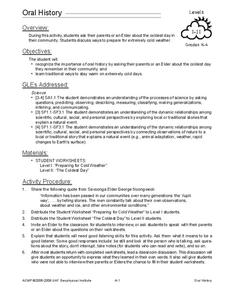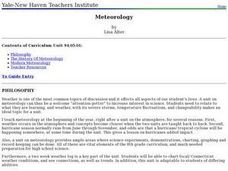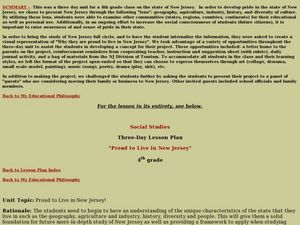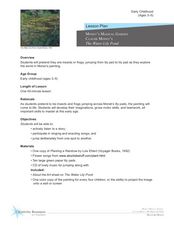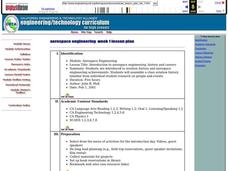Curated OER
Oral History
Students interview a Native Elder to learn about oral history and cold weather. In this weather lesson, students ask an Elder about the coldest day they remember in their community and complete two worksheets for the topic.
American Institute of Physics
Women and the Manhattan Project
The Manhattan Project was a massive undertaking involving multiple sites and thousands of scientists and technicians. To gain an understanding of the women who participated in the project, groups select an oral history of a woman...
Curated OER
The History and Future of Flight
Students create a PowerPoint presentation and oral report on the history and future of flight. In this flight lesson, students work in small groups to research the history and future of flight. Students then write a report with...
Curated OER
Civilizations of the Ancient Near East
Sixth graders investigate ancient civilizations by creating a research project. In this world history lesson, 6th graders investigate historic civilizations developed close to important rivers of the near East. Students...
Curated OER
The 1927 Flood
Upper elementary and middle schoolers examine the Great Flood of 1927 in the state of Arkansas. They each prepare an oral report about this flood and the huge impact it had on the economics of that time. Additionally, learners research...
Curated OER
Meteorology
Students research and produce an oral history that reflects the importance of meterologists in the lives of people in their community.
Curated OER
History of Blood Transfusions
Eighth graders use the Internet to research the important people in history of blood transfusions. In this blood transfusions lesson students prepare and present an oral presentation of their research.
Curated OER
Fossils: The Eras of the Earth's History
Learners research the four geologic eras of Earth's history. In this extension on a fossils lesson, students research the different eras of Earth's history. Learners use AppleWorks to create a bar graph containing information of the four...
Curated OER
Ancient Hunters of the Great Lakes
Students describe theories on how the first humans came to America and show the evidence that supports it. In this investigative lesson students study given material and prepare written or oral reports in their groups.
Curated OER
Proud to Live in New Jersey
Students explore New Jersey. In this New Jersey social studies lesson, students define vocabulary and participate in activities centered around the agriculture, geography, industry, history, and culture of New Jersey. Students construct...
US Environmental Protection Agency
Water, Now and Then
Students describe, orally or in writing, ways people have depended on water during different periods of history. This nearly 500 page document is rich with diverse lessons and activities that will transform your young learners into...
Curated OER
Making Paper
Students explore paper making. In this cross curriculum multicultural ecology and art lesson, students follow written and oral instructions to make paper using common household items. Students predict the amount of paper use in their...
Curated OER
Oil and its Everyday Uses
Explore the properties of oil through an experiment. They use the scientific process to investigate oil, participate in experiments, watch videos,and use information from the internet to determine how oil has changed our...
Curated OER
Indians in Georgia: How Do We Know What We Know?
Students discover archaeology by investigating the history of Native Americans in Georgia. In this U.S. history lesson, students participate in a mock archaeological excavation in their classroom by recovering artifacts and...
Missouri Department of Elementary
Equine Science
Did you know that horses have two sets of teeth? There is much to learn about horses, of course, and those interested in equine science will learn much from a 10-lesson agricultural science course that covers not only equine dental...
Curated OER
Monet's Magical Garden
Students study classic paintings by masters like Monet. In this art history lesson, students listen to the story Planting a Rainbow by Lois Ehlert and sing flower songs with the rest of their class. Students examine the painting The...
Curated OER
Genetics: Integrated with History and Art
Students work cooperatively in pairing chromosomes, created statistical genetic babies using the face lab, constructed a color DNA booklet and demonstrated mitosis in a flip book.
Curated OER
Uses of Minerals
In this minerals instructional activity, students read an excerpt about gold and then respond to the questions that follow. They explain how the weight of gold affected the history of some western states and why gold is expensive.
Polar Trec
Talk Story: A Native Way of Knowing
The steps of the scientific method examine a problem, make a prediction, and attempt to solve the problem—similar to the path most stories take. In the activity, individuals see how stories can explain natural events similar to the way...
Curated OER
Aerospace Engineering
Students are introduced to aviation history and aerospace engineering achievements. They assemble a class aviation history timeline from individual student research on people and events.
Curated OER
You Are What You Drink!
Students explore water treatment systems. In this water conservation ecology lesson, students identify and explain several processes used for water treatment and define related vocabulary after listening to content information given...
Curated OER
Earth's History
Sixth graders investigate how fossils are formed. They analyze a photo of the Grand Canyon, and create a fossil cast and mold using plaster of paris and shells.
Curated OER
Ancient Refuge in the Holy Land - International Phonetic Alphabet
Young scholars research the uses and symbols of the International Phonetic Alphabet. They complete a worksheet to translate and transcribe phrases of English into the International Phonetic Alphabet.
Curated OER
Determining the Geologic History of Rocks from a Gravel Deposit
Students apply the scientific method to identify rocks from glacial deposits, hypothesize how they got there and then test their hypothesis. They are given the experience of active, hands-on inquiry.
